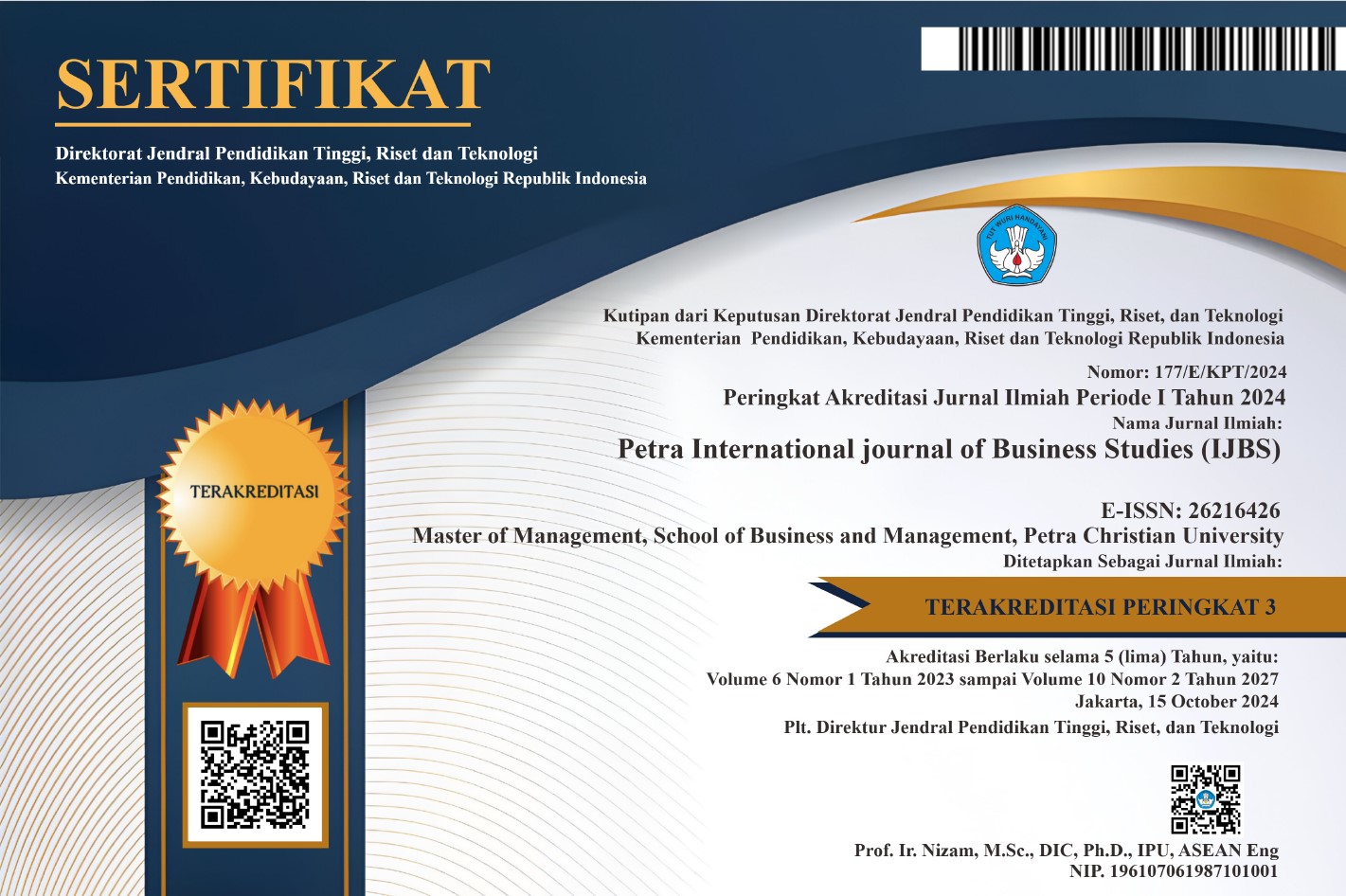A Thematic Analysis Exploration of Challenge-Based Learning Framework on Students of Academy X
DOI:
https://doi.org/10.9744/petraijbs.6.2.133-145Keywords:
challenge-based learning, growth mindset, thematic analysis, qualitative data analysis, application developmentAbstract
Education development has grown to accommodate various teaching and learning styles in recent years. Challenge-Based Learning, or CBL, is a learning framework conceptualized in 2006 at Apple's Classroom of Tomorrow Today that is built from the natural learning process of human beings. It recognizes that everyone comes equipped with their skills, knowledge, and interests, which opens the possibility for collaboration and teamwork across various knowledge and skill backgrounds. Academy X is an institution that builds its curriculum and activity on the foundation of challenge-based learning. One of the purposes of the Academy is to increase the employability level of the students after they graduate. This study uses Thematic Analysis of interview results with Academy students to see how the CBL process in the Academy is encouraging students to grow and become more successful even after the Academy, especially in facing their careers. In summary, this study confirms through the interview of 10 Academy students how the Challenge-Based Learning drives the development of Growth Mindset in terms of Professional capacity and Personal Development despite the existence of Hindrances along the way. As such, CBL facilitates students’ growth and development at the Academy for their future careers.
Downloads
References
Apple Inc. (2010). Challenge based learning: A classroom guide. Retrieved from https://www.apple.com/br/education/docs/CBL_Classroom_Guide_Jan_2011.pdf
Braun, V., & Clarke, V. (2006). Using thematic analysis in psychology. Qualitative Research in Psychology, 3(2), 77–101. https://doi.org/ 10.1191/1478088706qp063oa
Claxton, G., & Carr, M. (2004). A framework for teaching learning: The dynamics of disposition. Early Years, 24(1), 87–97. https://doi.org/ 10.1080/09575140320001790898
Cresswell, J. W., & Poth, C. N. (2018). Qualitative inquiry and research design: choosing among five approaches (Fourth). SAGE.
Dennis, K. S. (2016). Cultivating a growth mindset for effective adaptation in today’s dynamic workplace.
Dweck, C. S. (2016). Mindset : The new psychology of success.
Etikan, I. (2016). Comparison of convenience sampling and purposive sampling. American Journal of Theoretical and Applied Statistics, 5(1), 1. https://doi.org/10.11648/j.ajtas.20160501.11
Fahim, M., & Eslamdoost, S. (2014). Critical thinking: Frameworks and models for teaching. English Language Teaching, 7(7), 141–151. https://doi.org/10.5539/elt.v7n7p141
Fox, J., Gutierrez, D., Haas, J., Braganza, D., & Berger, C. (2015). A phenomenological investigation of centering prayer using conventional content analysis. Pastoral Psychology, 64(6), 803–825. https://doi.org/10.1007/s11089-015-0657-1
Johnson, L. F., Smith, R. S., Smythe, J. T., & Varon, R. K. (2009). Challenge-Based learning: An approach for our time.
Johnson, Larry. (2011). Challenge Based learning : the report from the implementation project. NMC.
Kotnour, T. (1999). A learning framework for project management. Project Management Journal. https://doi.org/10.1177/875697289903000206
Mason, M. (2010). Sample size and saturation in PhD studies using qualitative interviews. Forum Qualitative Sozialforschung, 11(3). https://www.qualitative-research.net/index.php/fqs/article/view/1428/3027
Masten, A. S. (2001). Ordinary magic: Resilience processes in development. American Psychologist, 56(3), 227–238. https://doi.org/10.1037/0003-066X.56.3.227
Miles, M. B., Hubermann, M. A., & Saldana, J. (2014). Qualitative data analysis (3rd ed.). SAGE.
Morse, J. M. (1994). Designing funded qualitative research.
Nichols, M. (n.d.). Framework - Challenge Based Learning - CBL framework. Retrieved November 23, 2022, from https://www.challengebasedlearning.org/framework/
Nichols, M., & Cator, K. (2008). Challenge Based learning white paper. Apple, Inc. Retrieved from https://www.challengebasedlearning.org/wp-content/uploads/2019/03/CBL_Paper_2008.pdf
Nichols, M., Cator, K., & Torres, M. (2016). Challenge Based learning guide. Digital Promise.
Ritchie, Jane., & Lewis, J. (2003). Qualitative research practice : A guide for social science students and researchers. Sage Publications.
Sullivan, T., & Page, N. (2020). A competency based approach to leadership development: Growth mindset in the workplace. In New Leadership in Strategy and Communication (pp. 179–189). Springer International Publishing. https://doi.org/10.1007/978-3-030-19681-3_13
Vaismoradi, M., Turunen, H., & Bondas, T. (2013). Content analysis and thematic analysis: Implications for conducting a qualitative descriptive study. In Nursing and Health Sciences (Vol. 15, Issue 3, pp. 398–405). https://doi.org/ 10.1111/ nhs.12048
Yang, Z., Zhou, Y., Chung, J. W. Y., Tang, Q., Jiang, L., & Wong, T. K. S. (2018). Challenge Based learning nurtures creative thinking: An evaluative study. Nurse Education Today, 71, 40–47. https://doi.org/10.1016/j.nedt.2018.09.004
Yeager, D. S., & Dweck, C. S. (2012). Mindsets that promote resilience: When students believe that personal characteristics can be developed. Educational Psychologist, 47(4), 302–314. https://doi.org/10.1080/00461520.2012.722805
Additional Files
Published
Issue
Section
License
Copyright (c) 2023 Andi Setiawan Abadi, Serli Wijaya, Oviliani Y. Yuliana

This work is licensed under a Creative Commons Attribution 4.0 International License.
Petra IJBS (e-ISSN: 2621-6426) is published by Master of Management program, School of Business and Management, Petra Christian University, Indonesia (MM SBM PCU).












